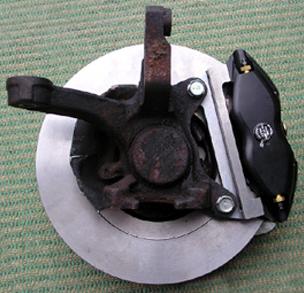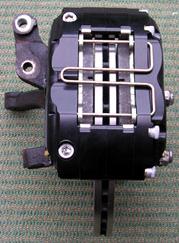BIGGER BRAKES
NOT QUITE SO BIG BRAKE UPGRADE
Hi, my name is Jonathan Bawden. I bought a white coupe with 53,000 miles on the clock
in June 2003. It's now just coming up to 60,000 and, as you all do, I smile
every time I drive it. Apart from changing all the fluids when I got it, a
cambelt change and oil changes every 3,000, the engine has needed no work and
the gearbox is sweet; shame really I am one of those sad people who likes
tinkering. At seventeen I chose my first car using the criteria: very cheap to
buy, very cheap to run, very, very cheap to insure and must not depreciate! A
1935 Austin Ruby for 50 quid seemed the ideal buy. I drove it home, a raw but
proud car owner, through the Mersey tunnel where the blue smoke was quite noticeable, I emerged from the other side
in first gear at 5mph thankful I had avoided the £50 fine for breaking down in
the tunnel!! The engine was completely knackered so I had no choice but to strip
and completely overhaul it. What an experience, what a great car, wish I still
had it.
However, getting back to the MR2; it is fun; it is reliable, but 120bhp does not do it
justice. Paul Wood's articles caught my attention, 200+ bhp sounds like serious
fun, not to mention the challenge of actually getting the turbo or V6 engine
into our tiny karts. Seeing Paul's turbo car at Billing and chatting with him
provided further inspiration and encouragement! Obviously when considering such
a power increase better brakes and some suspension changes are necessary. By
aiming to do these first I can make some progress whilst collecting the parts
for the engine transplant.
When considering the brake conversion I wanted to try to avoid modifying parts, and
if possible make it useable with wheels smaller than 17inch and also keep the
cost commensurate with the value of our cars.
From Paul's conversion I liked the idea of the 1989 VW Corrado G60 front discs which
are 280 mm diameter 22mm thick vented and bolt straight onto the MK1 hubs (front
or rear). These discs are an inch greater diameter than the MR2 ones so should
give excellent braking with 4pot calipers. As Paul mentions in his article, to
fit the MK1 hub, a small amount of metal has to be removed on the outer edge of
the machined face inside the bell of the disc. This can be achieved by careful
use of an angle grinder or on a lathe. I was able to build up the new brake
assembly on a spare hub carrier lent to me by Andy Dempsey which was a great
help especially as I could do it in the comfort of my lounge instead of banging
my head in a dirty wheel arch. Thanks Andy! The Corrado disc fits snugly on the
MK1 wheel studs but to ensure perfect centring of the disc I made a ring to fit
the MK1 hub 54mm, and the hole in the disc 65mm. Having decided to use these
discs I hoped to be able to find some 4pot calipers giving an overall size that
would fit within a 15 or 16 inch wheel.
The first pair of calipers I looked at were off a Mazda RX7. They seemed promising as the
RX7 is quicker and heavier than the MK1 and they worked with a 280mm/22mm disc.
However, when I offered them up to the dummy hub the relative lug positions
would have made it difficult to make a bracket to hold the calipers in the
correct location. It would have been possible to chop the lugs off the calipers
and drill new mounting holes but this idea was rejected on various grounds!!
When looking at the cost of reconditioning calipers, around £150 + VAT a pair, I
discovered Willwood made 4 pot radial mount calipers to fit various size discs
new at £290 a pair including VAT and delivery. Because these calipers come in
various configurations I was able to select a pair to suit the Corrado disc size
and with pistons sized to give correct pedal travel with the MK1 master
cylinder. Also the radial mounting enables them to be fitted to almost any car
with a suitable, relatively simple, mounting bracket. I made a bracket out of
aluminium alloy for a test fit and made slight changes for the final pair which
made from mild steel for long term reliability. The photos show the new calipers
and discs fitted to Andy's hub.
Of course
bigger brakes means bigger wheels but carrying the whole dummy set up was heavy
and caused some raised eyebrows when I lugged it into Halfords to check out
their wheel display! So to help my search I made a metal template, to represent
the cross section of the discs with calipers, which can be popped into the back
of a prospective wheel to see if it will fit. The planned engine transplant will
require some extra rubber so I went for a chat with Tony at Direct Tyres in Stockport,
highly recommended if you live within reach. Since the car will primarily be
for road use, with the planned power and torque, he recommended we choose tyres
to try to keep it on the road in the wet. He consulted Yokohama
and came up with a 17" or 16" wheel package with A539s. I went for
the 16", so he got me a wheel in (TSW Apex) to check with the template, it
fitted with plenty of clearance. The set of four 205/45/16 Yokos on the TSW Apex
16x7 wheels was £500 which compares well with lots of the cheap packages on the
net. They fit nicely in the arches; the front tyres have about 7mm clearance
from the bottom of the spring, which should be fine.
The final requirement is a pair of new front hoses with appropriate end connections. These
will be made up to suit using Goodrich braided hose by another local firm Iddons.
Since starting this conversion I have taken my car off the road for the engine
transplant so sadly I will have to wait to find out if these brakes work!
JONATHAN BAWDEN 0161 427 5636
BREMSPORT BRAKE CONVERSION
I guess I’ll start by explaining why I wanted to do this conversion since
some might consider it both overly expensive and unnecessary. Basically I have an early MR2 (small brakes), which I have
endowed with a supercharged engine, courtesy of Fensport. Driving fast is my
passion, so I take it to many track events, where it performs very well, but
lap-by-lap the brakes can get consistently more ‘dodgy’.
So that’s the story and it starts with an outlay of approximately £8-900
at Demon Tweeks. When the kit arrived it looked awesome, the discs where the
size of small wheels and the huge alloy callipers looked really racey. A quick
look at the instructions and the various bits were easily assembled with no more
than a hexagonal bit and a spanner. So I popped the car up on axle stands and
started by removing the callipers and discs. Easy! The callipers simply unbolted
and came away without complaint and removing the disc was just a case of
tightening a bolt, into a pre-tapped hole to push it off the hub. Now this is
where the problems started. Firstly the calliper may have come away nicely, but
the brake line connection wouldn’t budge. On closer inspection, the connectors
supplied, were not a match for my new callipers either. The manufacturer TAS
could not shed any light on this, so I was forced to have some new brake pipes
custom made, by a local hydraulic firm. Since I was no longer required to
struggle with the old connections, I simply cut them away.
The next problem was
simpler. On offering up the new discs it was clear that the protective backing
plate behind the disc would interfere more than a little with the rotation of
the disc. However removal was not necessary, as a little gentle bending and a
little coaxing with an angle grinder soon saw off the problem, now the discs
went on cleanly and I expected the same from the callipers but for some reason
they just would not bolt up. I assumed I was going insane, as I believe did
Demon Tweeks and TAS. After about a week of phone calls attempting to convince
TAS, that both a problem existed and that it was their fault, I finally
succeeded. The 2 different threads tapped into the alloy adapter plates had been
swapped in position at manufacture and I would have to wait for a new batch to
be made (the whole batch was wrong). About 7 weeks off the road later, I
received replacements and everything fitted together nicely, what could possibly
go wrong now? OK I broke a bleed nipple while bleeding the calliper, but no big
deal I had a spare.
Then it happened, the wheels went back on but wouldn’t turn, my 16”
rims weren’t big enough! I couldn’t believe it. I must have bought the best
brakes in the world; I couldn’t move the car at all! After swearing profusely
and grinding a couple of nonessential peaks off the callipers, the wheels
would turn. But only the width of a piece of paper would pass between the two
and the closest point of contact was now a brake pipe, which runs across the top
of the calliper. This could definitely not be taken out on the track; as any
heat expansion would risk rupturing the pipes.
So several months on and I have a new set of 17” wheels (Alan Jones has
my 16’s) and how does the car brake? Well they really are very sharp, but the
car does not seem as well balanced, nose diving more noticeably and tending to
lock up the front more, particularly in the wet. I guess I’ll have to take it
on the track, before I can give a true opinion, but my feeling is that the back
brakes will need some work to compensate.
Would I recommend the kit to any one else? Only if you are a very serious
speed demon, the enormous cost and potential hassle of the job, should make
anyone of sound mind go and buy some sports pads and discs, from someone like
Fensport. If you’ve really got to have the ultimate in stopping power though,
just get out that chequebook and look no further.
Chris Johnson

